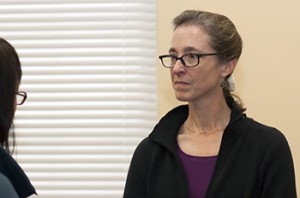Dr. Robin Nagle writes that her research “unfolds along the curbs, edges, and purposely forgotten quarters” of society.
Nagle, nicknamed Dr. Garbage, is a clinical associate professor of anthropology and urban studies at New York University and the anthropologist-in-residence at the Department of Sanitation in New York City.
You see, she studies the Big Apple’s garbage collectors, perhaps the most overlooked and underappreciated sectors of organized society. A city can’t run efficiently without the proper removal of its refuse. And most of us don’t take note until our own trash piles up along the curb.
Nagle presented her lecture, “Labors of Waste and the Value of Knowledge,” to Baxter Hall Monday, hoping to shed some light on the humanity that accomplishes the feat with nary a pat on the back.

She presents compelling research in a conversational tone that brings some of the san men to life. In order to tell that story more completely, Nagle passed the necessary tests and became an NYC Department of Sanitation employee, embedding herself in unit and earning the trust of the lifers within.
The invisibility afforded to garbage collectors isn’t unlike that of most support staff members of any institution, who toil for recognition every now and again, but are absolutely responsible for keeping the organization humming along smoothly.
“At first, it (the invisibility) made me mad, but then I also realized it was a tremendous privilege,” Nagle said. “If you are three feet from me and you are completely ignoring me, then I can watch you unfiltered. I can just watch.
“The street becomes a kind of theater and you are the inadvertent audience,” she continued. “A lot of sanitation workers feel that way, like ‘I’m fine being invisible,’ because there is a perk to that. You are the fly on the wall.”
It’s a bonus to an anthropologist – trained or amateur – to get such unfiltered access. In other words, to know what it’s like behind the scenes. Few understand the rhythms of an institution like those who pick up after it.
So how do the essential and the invisible find a balance?
“That’s a big question about how we as a culture value or ignore certain aspects of life,” said Nagle. “The whole issue of maintenance generally is one of those. Think about the maintenance staff of this place. Who knows their names or thanks them? Some do, but most don’t, and that’s just a cultural habit.”
As the last of nearly 50 in attendance to leave Baxter Hall, I noticed that there were some empty pizza boxes left on the floor for someone else to pick up.
I suppose some habits are hard to break.